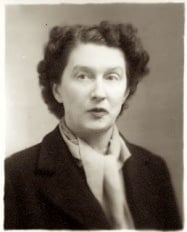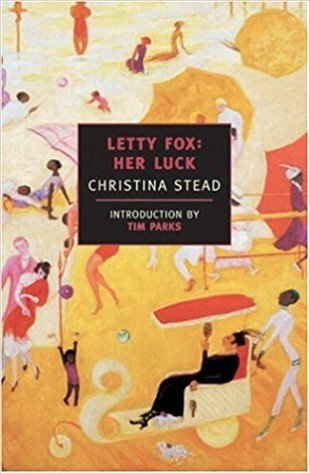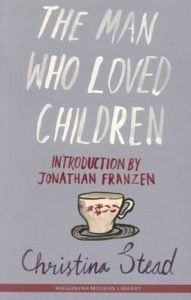Christina Stead, Author of The Man Who Loved Children
By Hannah Wright | On August 14, 2012 | Updated February 29, 2024 | Comments (2)

Christina Stead (July 17, 1902 – March 31, 1983) was an Australian-born novelist, short story writer, and Journalist born into a Socialist family.
Her masterful writing went unrecognized for much of her life. Her most notable work is The Man Who Loved Children.
Early Life
Stead’s mother, Ellen, died when she was only two years old. For a while, Stead enjoyed the close bond as an only child to a widower father, David Stead. Her father was a passionate naturalist who told wild and vivid stories imparting his wonder for the natural world onto Christina.
She described of her early childhood in a 1968 article in the Kenyon Review:
“I was the first child of a lively young scientist who loved his country and zoology. My mother died – he mothered me. I went to bed early and with the light falling from the streetlamp through the open slats of the venetian blind he, with one foot on the rather strange bed I had, told his tales. He meant to talk me to sleep; he talked me awake.”
Things did not go on like this forever. Her father remarried twice and had five more children. Stead took on the partial responsibility of raising her siblings and grew unhappy in her home life. She went to college, then worked as a teacher and secretary. Eventually, she set out to forge a life of her own away from Australia.
Early Career and Marriage
Stead moved to London at age twenty-six, where she fell in love with Jewish-American novelist and economist William J. Blake. Together they traveled around Europe, settling in Paris from 1929 to 1935.
Paris suited her well – this period was productive and full of wonder. She described the city as “pearl of delicacy, brilliance and suavity,” and is quoted as saying Paris is the “capital of the modern world.”
She spoke several languages including French, German, and Yiddish, which she likely picked up during her travels.
While living in Paris, Stead worked a variety of jobs, including a secretarial position at Travelers Bank. There, she gained insight into the tumultuous 1930s financial market. This experience, in addition to the rise of fascism and political unrest in Europe at the time, informed her novel House of All Nations (1938).
Move to the U.S.; Communist ideology
In the late 1930s the couple moved to the United States, both taking jobs as screenwriter for Metro-Goldwyn-Mayer. In addition, Stead taught novel writing at NYU, reviewed Australian novels for the New York Times, and contributed articles to New Masses – a communist journal. Her articles are still available to read online.
Stead held strong communist convictions, which influenced so much of her life’s work but was also likely the unfortunate reason she was overlooked as an author.
Following World War II, tensions grew between United States and Soviet Union sparking the Cold War. Fear of communism and it’s threat to democracy grew. In 1938 the House Un-American Actives Committee was established as well as the Hollywood blacklist.
Stead and Blake returned to England in 1947 because to these growing anti-communist sentiments in the U.S.
The move to England was the beginning of a few terrible decades. She found the country to be uninspiring and gloomy. Her and Blake struggled to make ends meet. This dreary time in her life inspired her novel Cotters’ England (1966), set in post-war England.
. . . . . . . . . . .
The Man Who Loved Children by Christina Stead
. . . . . . . . . .
Later Life and Long Overdue Fame
Stead wrote fifteen novels and numerous short stories but didn’t gain the success she felt she deserved at the time. She was considered a misanthrope and unapproachable person who revealed little of herself even as she self-invented. She destroyed many of her personal papers, making it more difficult to preserve her legacy.
Finally, in the 1960’s Stead began to receive recognition. In 1965, The Man Who Loved Children was reissued. Its success was in part due to an introduction written by Poet Randall Jarrell.
Writer Saul Bellow is also partially responsible for her bringing her into the spotlight; 1976, he mentioned her in his Nobel Prize acceptance speech.
In her works, the main characters were often based on herself, and the stories derived from her life. In her best-known work, The Man Who Loved Children, the father was based on her own, and the title is rather ironic.
In 2010 The Man Who Loved Children received positive recognition yet again after novelist and essayist Johnathan Franzen published an essay about the book in The New York Times.
Stead also addressed the negative impact of governments on societies.
Christina Stead’s Legacy
Considered a masterful writer, Stead was also adept at self-concealment and re-invention. One of her most famous quotes is “Every human being is a sort of monster, if you get to know them.” Perhaps she was slyly referring to herself.
In the description in Christina Stead: A Biography (1995) by Hazel Rowley, she’s described:
“An intensely private person and an incredibly cantankerous one, Stead lived a life that was stormy, eccentric, and brave. She was highly political and maddeningly contentions — few would call her easy in life or in fiction. And yet, in her life, her work was likened to that of Balzac, Joyce, Ibsen, and Tolstoy. But, in fact, it was uniquely her own.”
She returned to her native land of Australia in 1969 after the death of her husband. Upon her return she was honored with praise for her brilliant work. In 1974, she became the first person to receive the Patrick White Prize. White was the first Australian to receive a Nobel Prize for literature.
Stead spent the last year of her life in the home of the Australian doctor Helena Berenson, who took care of her even though they were practically strangers to one another. Christina Stead died in the spring of 1983, at the age of eighty.
. . . . . . . . . . .

More about Christina Stead
On this site
Major Works
- The Man Who Loved Children
- Letty Fox: Her Luck
- Puzzleheaded Girl
- For Love Alone
- Cotters England
- I’m Dying Laughing: The Humorist
Biographies about Christina Stead
- Christina Stead: A Biography by Hazel Rowley
- Christina Stead: Life and Literature by Joan Lidoff
- Christina Stead by Diana Brydon
- Dearest Munx: The Letters of Christina Stead and William J. Blake
More information
- Melbourne University Publishing: Christina Stead and Her Life in Letters
- Institute for the French Australian Relations
- The Big Lookback: Christina Stead
- Return of A Native

This is a very shallow and misleading piece. Stead is an award winning writer, whose most famous novel, The Man Who Loved Children, has never been out of print. She is the subject of a definitive biography by Hazel Rowley, which I recommend to anyone who would like an accurate representation of her life and achievements. The tone and dismissive attitude expressed here is disappointing and wholly unjustified.
Hi Kate, thank you for your comment. I see from the original date on this post (August 14, 2012!) that it was published when the site was very new. Our posts were certainly not as thorough back then and though there’s a slight update in 2022, it’s certainly not up to the quality of more recent biographies on the site. I didn’t mean to be dismissive, though clearly it’s an incomplete piece.
I’ll put it on the list of posts to update; though if you’re a Christina Stead expert (or admirer), might you be interested in doing so?